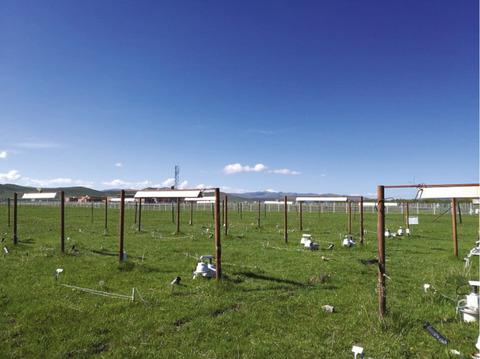Our official English website, www.x-mol.net, welcomes your
feedback! (Note: you will need to create a separate account there.)
High‐level rather than low‐level warming destabilizes plant community biomass production
Journal of Ecology ( IF 5.3 ) Pub Date : 2021-01-07 , DOI: 10.1111/1365-2745.13583 Quan Quan 1, 2 , Fangyue Zhang 1, 2 , Lin Jiang 3 , Han Y.H. Chen 4, 5 , Jinsong Wang 1 , Fangfang Ma 1, 2 , Bing Song 1, 2 , Shuli Niu 1, 2
中文翻译:

高水平而不是低水平的变暖破坏了植物群落生物量的生产
更新日期:2021-01-07
Journal of Ecology ( IF 5.3 ) Pub Date : 2021-01-07 , DOI: 10.1111/1365-2745.13583 Quan Quan 1, 2 , Fangyue Zhang 1, 2 , Lin Jiang 3 , Han Y.H. Chen 4, 5 , Jinsong Wang 1 , Fangfang Ma 1, 2 , Bing Song 1, 2 , Shuli Niu 1, 2
Affiliation

|
- Ecosystem stability is essential to its sustainable functions and services to humanity. Although climate warming is projected to vary from 1 to 5°C by the end of 21st century, how the temporal stability of plant community biomass production responds to different warming scenarios remains unclear.
- To fill this knowledge gap, we conducted a 6‐year field experiment with three levels of warming treatments (control, +1.5°C, +2.5°C) by using infrared radiators, in an alpine meadow on the Qinghai–Tibet Plateau.
- We found that low‐level warming (+1.5°C), compared to the control, did not significantly change the temporal stability of plant community biomass production and its underlying causes, including species diversity, compensatory dynamics, mean–variance scaling, biomass temporal stability of plant population (the average of temporal stability of species biomass production of all species in the community) or dominant species. However, high‐level warming (+2.5°C) significantly reduced them. Species diversity was not a significant predictor of temporal stability of plant community biomass production in this species‐rich ecosystem, regardless of the magnitude of warming, while co‐existing species compensatory dynamics and the biomass temporal stability of dominant species determined the response of temporal stability of plant community biomass production to warming.
- Synthesis. Our results suggest that the responses of plant community biomass temporal stability and its underlying mechanisms to climate warming depend on warming magnitudes. The findings highlight the various responses of ecosystem functions and services to different warming scenarios and imply that ecosystem will fail to maintain and provide stable biomass‐related services for humanity under high‐level climate warming.
中文翻译:

高水平而不是低水平的变暖破坏了植物群落生物量的生产
- 生态系统的稳定性对其可持续功能和对人类的服务至关重要。尽管预计到21世纪末气候变暖的温度范围为1至5°C,但尚不清楚植物群落生物量生产的时间稳定性如何响应不同的变暖情况。
- 为了填补这一知识空白,我们在青藏高原的高寒草甸上进行了为期6年的野外试验,使用红外辐射器对三种水平的升温处理(控制,+ 1.5°C,+ 2.5°C)进行了研究。
- 我们发现,与对照相比,低水平变暖(+ 1.5°C)不会显着改变植物群落生物量生产的时间稳定性及其根本原因,包括物种多样性,补偿动态,均值方差缩放,生物量时间植物种群的稳定性(社区中所有物种生物量的时间稳定性的平均值)或优势物种。但是,高温(+ 2.5°C)会大大降低它们。无论变暖的程度如何,物种多样性并不是这个物种丰富的生态系统中植物群落生物量生产时间稳定性的重要预测指标,
- 综合。我们的结果表明,植物群落生物量的时间稳定性及其对气候变暖的潜在机制的响应取决于变暖的程度。研究结果强调了生态系统功能和服务对不同变暖情景的各种反应,并暗示在高水平气候变暖下,生态系统将无法为人类提供维持和稳定的生物质服务。











































 京公网安备 11010802027423号
京公网安备 11010802027423号